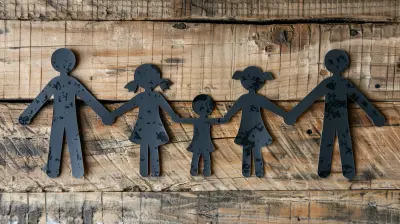Enhancing Communication Skills with After-School Debate Teams
15 June 2025
Have you ever watched your child struggle to put their thoughts into words? Maybe they stumble when speaking in public or shy away from classroom discussions. As parents, we want to give our kids every tool they need to thrive—and believe it or not, after-school debate teams might just be one of those hidden gems we overlook.
Let’s talk about how these clubs can do so much more than just sharpen argumentative skills. Debate teams don’t just build little lawyers—they build confident, articulate, and socially aware young people. So, if you’re curious about how to help your child speak with clarity, stand a little taller, and think more critically, pull up a chair.

Why Communication Skills Matter (Now More Than Ever)
Think about it. In this fast-paced, text-heavy world, communication can make or break opportunities. Whether it’s a classroom presentation, a college interview, or even pitching a school project—how well a child can express themselves really counts.Communication is more than just talking. It’s:
- Listening with intent
- Responding thoughtfully
- Presenting ideas clearly and compellingly
All these abilities don’t just pop up overnight; they need practice. That’s where after-school debate teams step in like a secret weapon.

What Exactly Happens in After-School Debate Teams?
Great question!At first glance, debate might seem like kids arguing with fancy words—but it’s not about winning fights. It’s about structured discussions, critical thinking, and respectful disagreements. Students are given topics (some serious, some fun), then they research, structure arguments, and present their side—all while respecting opposing views.
Here’s the cool part—they don’t have to agree with the side they're defending. This teaches them empathy and the ability to see both sides of the coin. Pretty neat, right?
A Quick Snapshot of Debate Practice
- Topic assigned: Could be anything from school uniforms to climate change.- Team collaboration: Students research in groups, building each other up.
- Speech writing: Each student writes and rehearses their part.
- Debate time: Presenting arguments in front of peers, teachers, or even judges.
- Feedback loop: Students get constructive critiques to improve next time.
It’s a loop of learning, reflecting, and growing.

How Debate Teams Boost Communication Skills
Let’s break it down. Here’s how after-school debate teams help your child become a communication ninja:1. They Learn to Organize Their Thoughts
Have you ever heard your kid go in circles trying to explain a simple story? Debate teaches them structure. Beginning, middle, end. Point, reason, example. It’s like giving them a roadmap for their thoughts. And once they have it, it’s easier for them to talk with purpose.2. They Build Confidence (Even the Shy Ones)
At first, it’s scary. But over time, after speaking a few times, something shifts. Their voice gets a little louder. Their eyes stop darting around. Suddenly, they’re owning the stage like little TED Talkers. And that confidence? It spills into every area of life.3. Listening Becomes Their Superpower
In debates, if you don’t listen, you miss your chance to strike back with a killer argument. So, kids learn to listen. Actively. Not just to respond, but to understand. That’s gold, especially when you think about friendships, teamwork, and life in general.4. Critical Thinking and Quick Responses
Ever wished your kid would think before they speak? Debating forces them to. They practice analyzing information, separating facts from fluff, and responding on the spot. It's like mental gymnastics—and just like muscles, the more they use their brain, the sharper it gets.5. Respectful Disagreement
Let’s be real—unfiltered social media arguments are not models of healthy communication. Debate teaches that you can completely disagree with someone and still be respectful. How refreshing is that?
Surprising Side-Benefits of Joining a Debate Team
Okay, so communication is the star of the show, but guess what? There are hidden perks, too.✏️ Better Academic Performance
Why? Because debating forces students to research, read critically, and write persuasively. Sound familiar? Yep, those are all academic super skills.🤝 Stronger Social Skills
These teams aren’t just about studies. They bond. They support each other. They laugh. They become a mini family. And learning to work in a group, lead discussions, and share the spotlight? Priceless.💡 Increased Awareness
Debate topics often involve real-world issues. That means your child starts to care more about what’s going on around them. From politics to the environment, they're suddenly more curious and aware.⏰ Time Management Mastery
Kids juggle research, schoolwork, and speech prep—usually in short time frames. Suddenly, procrastination's worst enemy is your child on a debate deadline.But What If My Child Isn’t a “Natural” Speaker?
Here’s the beautiful part—debate teams aren’t just for loud, fast-talkers. They’re especially good for quiet kids who might have amazing ideas but don’t always know how to voice them.Think of a debate team like a gym for the mind and voice. Everyone starts at their own pace. Some lift heavier (i.e., speak more), but everyone builds strength. And coaches? They specialize in drawing kids out of their shells, gently but steadily.
How You Can Support Your Child’s Debate Journey
You’re part of this adventure too! Here’s how you can support them:1. Show Up for Their Debates
Attending even just one debate can light up your child’s day. Your presence says, “I value what you’re doing.” Simple but powerful.2. Be Their Practice Audience
Let them rehearse their speech at home. Give honest but gentle feedback. Or just nod and smile—that works too.3. Talk About Current Events at Dinner
Chatting about what’s happening in the world encourages curiosity and critical thinking. Keep it age-appropriate, obviously. Think of your dinner table as a mini think-tank.4. Help Them Manage Time
Between homework, hobbies, and debate prep, it’s easy to get overwhelmed. Help them plan, prioritize, and avoid last-minute stress.5. Celebrate Wins (And Lessons from Losses)
Won a round? Celebrate! Lost one? High-five them for trying and talk about how they’ll come back stronger. Debate teaches that losing isn’t failing—it’s learning.Finding the Right Debate Team
Not all programs are created equal, so here’s what to look for:- Supportive Coaches: Are they encouraging and inclusive?
- Welcoming Environment: Do kids feel safe and supported?
- Balance of Competition and Fun: Are they learning without burning out?
- Diverse Topics: Are kids exploring a broad range of issues?
Check your child's school, local community centers, or online programs. There are even virtual debate clubs now that make it easy to join from home.
Real Stories, Real Change
Still unsure? Let me share a quick story.There’s a 13-year-old girl named Maya. Shy, barely spoke above a whisper. Her mom signed her up for debate reluctantly. The first few sessions? Tears and nerves. But by her third competition, she was making judges laugh, pulling out facts like a pro, and even coaching younger teammates.
Today? She’s leading her school’s debate team. Pretty incredible.
That’s the magic of pushing through the awkward beginnings.
Final Thoughts: It’s Not Just About Talking—It’s About Thinking
Let’s face it—raising kids today is no small feat. We’re not just preparing them to pass exams; we’re helping them become strong, thoughtful, confident humans. After-school debate teams are more than just clubs—they’re growth zones.So, if your child has ever struggled to speak up, organize their thoughts, or stand tall in front of others, this might be more than an extracurricular. It might be the beginning of their voice being heard.
What if their next “I can’t” turns into “I’ve got this”?
all images in this post were generated using AI tools
Category:
After School ActivitiesAuthor:

Tara Henson
Discussion
rate this article
2 comments
Astrid McTavish
What an intriguing discussion on the benefits of after-school debate teams! I'm curious: how do these programs specifically foster not only communication skills but also critical thinking and teamwork among kids? It seems like such a valuable experience—I'd love to hear more about success stories!
June 19, 2025 at 4:49 AM

Tara Henson
Thank you for your interest! After-school debate teams enhance communication skills by encouraging students to articulate their thoughts clearly and confidently. They foster critical thinking through research and argument analysis, while teamwork is developed as students collaborate to prepare and strategize. Many participants report improved confidence and enhanced academic performance as success stories!
Noah Wallace
This article highlights the benefits of after-school debate teams in developing children's communication skills, fostering critical thinking, and encouraging respectful discourse among peers. Great insights!
June 18, 2025 at 3:12 AM

Tara Henson
Thank you for the positive feedback! I'm glad you found the insights valuable.


